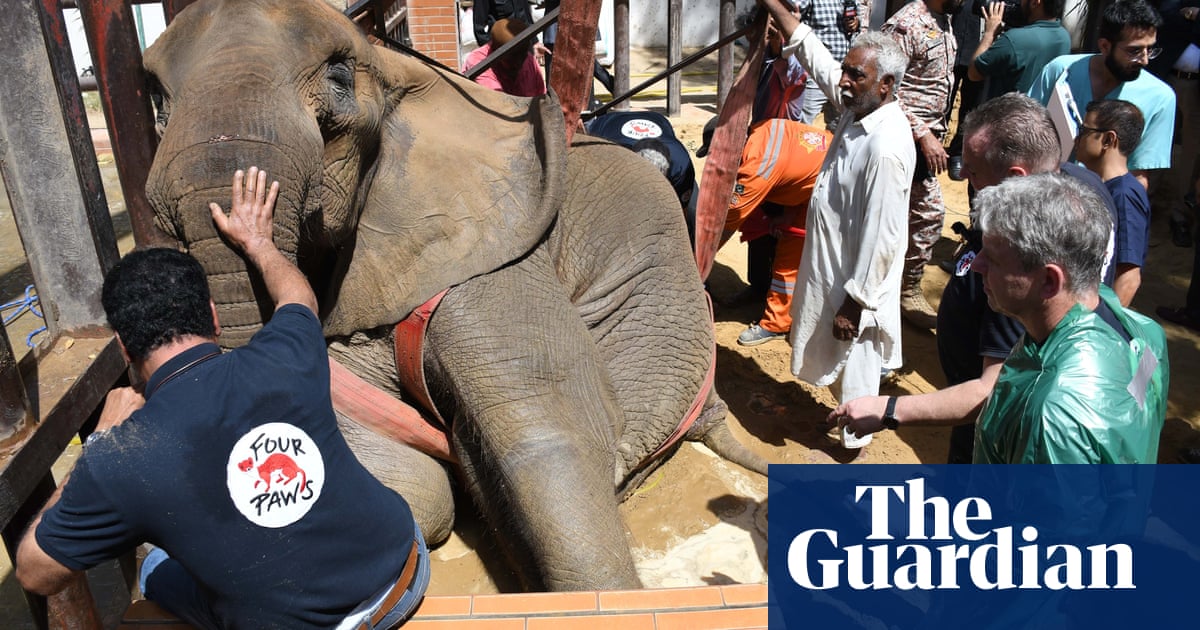
Pakistan’s zoos have faced criticism and calls for their closure after the death of a 17-year-old elephant in Karachi.
Noor Jehan, an African elephant, which have an average lifespan of 60 to 70 years, was already in poor health when she fell into a pond last month and was unable to get up. She later died.
The international animal welfare charity Four Paws said the Karachi zoo was not equipped to take care of elephants, and on a visit last year had advised that Noor Jehan and her companion, Madhubala, needed to be moved to a more species-appropriate home.
“Sadly this recommendation was not heeded in time to save Noor Jehan and now they have agreed to relocate Madhubala,” the charity said. “Noor Jehan’s tragic story is a reminder of the suffering that captive wild animals endure in Pakistan and around the world.”
The Pakistani federal government and the administration of Sindh province are now considering the calls to shut down Karachi’s zoo. Four Paws described it as a possible “turning point for the welfare of wild animals in captivity in Pakistan”.
Many cases of animals suffering in Pakistan’s zoos have surfaced in recent years. Two lions died in Islamabad’s now closed zoo in 2020 while being transferred, and in 2021 a rare white lion died in Karachi.
The Islamabad high court had ordered the removal of all the city zoo’s animals because of their care conditions, including the elephant Kaavan, called “the world’s loneliest elephant”, who became the subject of a high-profile campaign by the US singer and actor Cher to bring him to a Cambodian sanctuary.
Calls to shut down zoos have grown in Pakistan after Noor Jehan’s death. Ayesha Chundrigar, the founder of an animal rescue organisation, said: “Wild animals belong in the wild. Captive wild animals in today’s day and age must be in wildlife sanctuaries, not in jails.”
The director of the Karachi zoo, which is managed by the Karachi Metropolitan Corporation (KMC), was removed from his job this month over complaints of negligence.
Quatrina Hosain, an animal rights activist who followed the case of Noor Jehan closely, said there were frequent cases of neglect, and noted that zoos were run by metropolitan and development authorities and corporations, which mainly deal with municipal services.
She said she personally opposed wildlife being kept in captivity but recognised that zoos could not be shut down overnight.“We need to come up with a coherent national plan for caged wildlife and for that we need to update the animal welfare act 1890,” said Hosain, although she added she did not see that happening.
“There will be extreme resistance in closing down zoos because zoos are a major source of revenue,” she said. “The zoo authorities are very defensive in their tasks and there is extreme hostility between zoo authorities and animal rights activists. There is virtually no empathy for the animals from the administration.”
Chundrigar said: “All I know in my 10 years of trying to bring animal welfare to Pakistan is that we don’t understand animals.”
The Pakistani government last year launched an animal rights curriculum for schools. The curriculum will reportedly be introduced this September in the country’s capital, Islamabad, and the federal government said it planned to work with provincial governments to introduce the curriculum in the provinces.
The Sindh government and the KMC did not respond to the Guardian’s multiple requests for comments.












